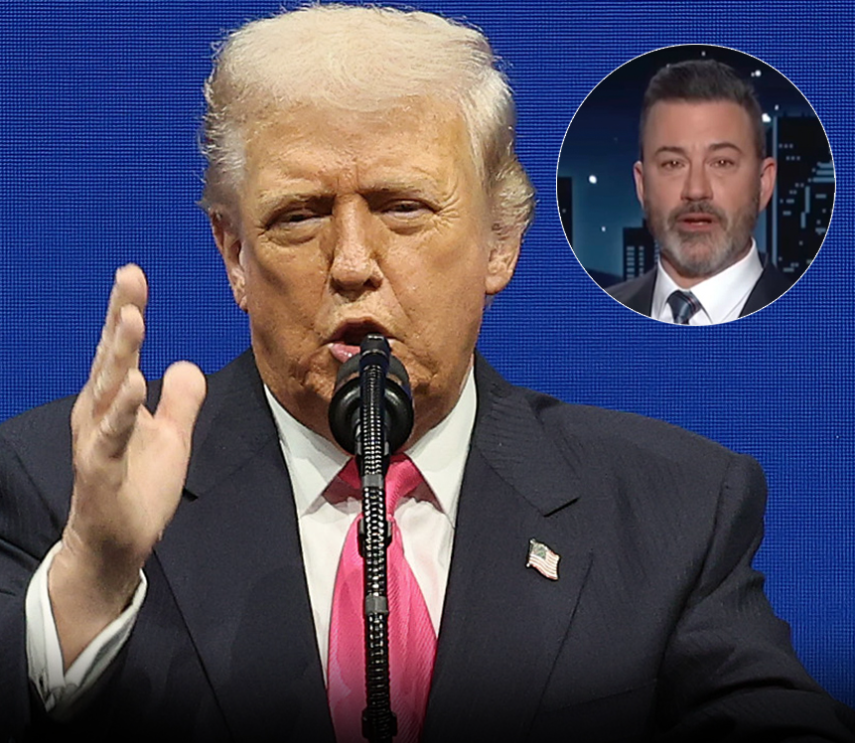What began as a seemingly innocuous late-night bit quickly spiraled into a full-blown political flashpoint, illustrating how entertainment, media, and politics now exist in an almost inseparable, high-stakes ecosystem. Jimmy Kimmel’s mockery over the looming release of the Epstein documents landed at precisely the wrong—or perhaps perfect—moment: Washington was attempting to project a rare image of unity through the Epstein Files Transparency Act, a measure designed to assure the public that government oversight would finally meet decades of scrutiny. Kimmel’s joke, lighthearted in intention but sharp in execution, punctured that carefully curated image. It reminded everyone that, no matter how serious or urgent the policy, satire can arrive uninvited, reshaping the narrative in ways officials often cannot control.
Trump’s furious response on Truth Social was immediate, personal, and unmistakably performative. Labeling Kimmel “talentless” and dismissing ABC as “fake,” the former president did more than reignite a rivalry that had simmered for years—he revealed just how fragile the veneer of unity really was. In a single post, he exposed the delicate balancing act behind public messaging, showing that even a joke could provoke reactions capable of shaking political strategy to its core. The episode highlighted the collision of entertainment and raw political power, a collision in which humor is weaponized, and where satire ceases to be harmless and instead becomes an arena for the assertion of authority, influence, and personal vendetta.
Within days, what might have seemed a one-off spat escalated into something far larger. Trump’s attacks were not confined to Kimmel alone; they spread to other late-night hosts, demonstrating a systematic response to media perceived as adversarial. The feud revealed how sensitive the former president remained to public scrutiny, especially regarding Epstein, and how the intersection of celebrity, journalism, and politics could amplify any perceived slight into a national talking point. Tense exchanges with ABC reporters, whether in the Oval Office, on Air Force One, or during off-the-cuff moments captured by cameras, showcased just how deeply the topic of Epstein unsettled him. Every interaction became a microcosm of the larger struggle over narrative control, credibility, and public perception, with each side attempting to define the stakes on its own terms.
ABC’s response to the attacks was blistering and precise, framing Trump’s accusations as nothing more than partisan theater, a strategy designed to both defend their reporting and highlight the performative nature of his online denunciations. Kimmel, meanwhile, leaned fully into the feud, unrepentant and defiant, turning his mockery into a statement of resistance against the convergence of media intimidation and political spectacle. Through monologues, social media, and interviews, the comedian reinforced the idea that satire is not only protected expression but also a cultural force capable of shaping public conversation. The interplay between Trump’s retaliatory tactics and Kimmel’s assertive humor underscored a new reality in American media: even a single punchline can trigger a cascade of political, social, and media consequences that ripple far beyond the moment of delivery.
In the end, the episode revealed less about one joke, one comedian, or one president than it did about the broader media landscape itself. Every quip, every insult, every tweet is now subject to magnification, interpretation, and politicization. Grudges that might once have remained private now erupt on national stages, and humor becomes both a weapon and a lens through which the public interprets power, personality, and policy. The clash highlighted the precariousness of public image, the volatility of partisan allegiances, and the reality that in today’s hyper-connected society, a simple joke can no longer remain “just a joke.” Instead, it can become a battlefield where satire, authority, and public perception collide, producing spectacle, controversy, and insight into the ways power is negotiated in modern America.
Ultimately, the Kimmel-Trump clash is emblematic of the age we live in: one where boundaries between news, entertainment, and political theater are fluid, where personalities overshadow policies, and where every moment—planned or impromptu—can reverberate across social media timelines, news cycles, and public consciousness. What started as a brief comedic jab became a lens through which to examine media influence, political sensitivity, and the complex choreography required to maintain credibility and control in a world where nothing, not even a joke, exists in isolation. It is a cautionary tale about immediacy, perception, and the power of narrative in an era defined by both rapid dissemination and relentless scrutiny.
